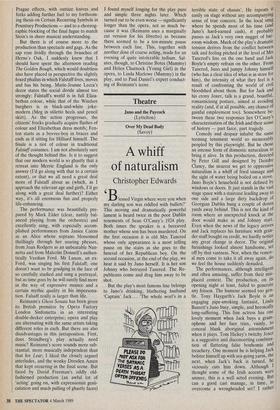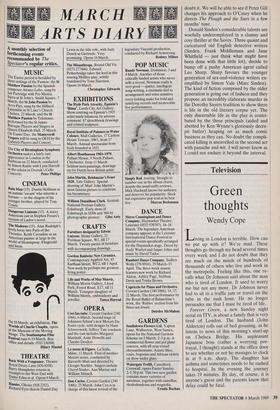Theatre
Juno and the Paycock (Lyttelton) Over My Dead Body (Savoy)
A whiff of naturalism
Christopher Edwards
B4 lessed Virgin where were you when my darling son was riddled with bullets?' This moving and dramatically powerful lament is heard twice in the poor Dublin tenements of Sean O'Casey's 1924 play. Both times the speaker is a bereaved mother whose son has been murdered. On the first occasion it is old Mrs Tancred whose only appearance is a most telling pause on the stairs as she goes to the funeral of her Republican boy. On the second occasion, at the end of the play, we hear it said by Juno herself. It is her son Johnny who betrayed Tancred. The Re- publicans come and drag him away to be shot. .
But the play's most famous line belongs to Juno's drinking; blathering husband `Captain' Jack ... 'The whole worl's in a terrible state of chassis', He repeats it easily on stage without any accompanying sense of true concern. In the local snug where he spends most of his time (and Juno's hard-earned cash), it probably passes as Jack's very own nugget of bar- room wisdom. Much of the play's dramatic tension derives from the conflict between talk and feeling pitched at the level of Mrs Tancred's line on the one hand and Jack Boyle's empty refrain on the other, From Tancred, Juno and jumpy Johnny himself (who has a clear idea of what is in store for him), the intensity of what they feel is a result of confronting the world of civil bloodshed about them. But for Jack and his crony Joxer, talk is a grand, boastful, romanticising posture, aimed at avoiding reality (and, if at all possible, any chance of gainful employment too). Somewhere be tween these two responses lies O'Casey's characterisation of the Irish and their sense of history -- part farce, part tragedy.
Comedy and deSpair inhabit the same teeming tenement world so memorably peopled by this playwright. But he chose an intense form of ddmestic naturalism to bring it alive. In this prOduCtion, directed by Peter Gill and designed by Deirdre Clancy, the nearest we get to oppressive naturalism is a whiff of fried sausage and the sight of water being boiled on a stove. Juno Boyle's household is not defined by windows or doors. It just stands in the vast stage space with a staircase leading away to one side and a large dirty backdrop of Georgian Dublin hung a couple of dozen yards away behind. This is not the kind of room where an unexpected knock at the door would make us and Johnny start. Even when the news of the legacy arrives and Jack replaces his furniture with gran- der stuff bought on credit, we hardly notice any great change in decor. The original furnishings looked almost handsome, set off by that vastness. Nor, when the remov- al men come to take it all away again, do we feel the house suddenly denuded. The performances, although intelligent and often amusing, suffer from their mis- placed context. The production, on its opening night at least, failed to generate any frisson. The humour seemed too gen- tle. Tony Haygarth's Jack Boyle is an engaging pipe-smoking fantasist, Linda Bassett's Juno busy, simple, and heroically long-suftering. This fine actress has one lovely moment when Jack buys a gram- ophone and her face tries, vainly, to conceal blank aboriginal astonishment when it plays. Tom Hickey's twitchy Joxer is a suggestive and disconcerting combina- tion of flattering false bonhomie and treachery. One moment he is helping Jack bolSter himself up with sea-going yarns, the next, when Jack's back is turned, he viciously cuts him down. Although I thought some of the Irish accents were unsure, this is a well acted evening. But can a good cast manage, in time, to overcome a wrongheaded set? I rather doubt it. We will be able to see if Peter Gill changes his approach to O'Casey when he directs The Plough and the Stars in a few months' time.
Donald Sinden's considerable talents are woefully underemployed in a clumsy and cosy thriller at the Savoy. Three quaint and caricatured old English detective writers (Sinden, Frank Middlemass and June Whitfield — just think what might have been done with that little lot), decide to bump off a pushy American agent called Leo Sharp. Sharp favours the younger generation of sex-and-violence writers ex- emplified by Simon Vale (Marc Sinden). The kind of fiction composed by the older generation is going out of fashion and they propose an incredibly elaborate murder in the Dorothy Sayers tradition to show there is life in the old literary corpse yet. The only discernible life in the play is contri- buted by the three principals (aided and abetted by Ken Wynne's gloriously decre- pit butler) heaping on as much comic business as they can. No doubt the compli- cated killing is unravelled in the second act with panache and wit. I will never know as I could not endure it beyond the interval.

















































 Previous page
Previous page